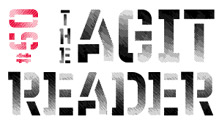
Under and Under
In the Red
After having whetted the appetites of the underground cognoscenti with an onslaught of releases of varied lengths put out on a host of labels over the last two years, the predominantly one-man band known as Blank Dogs (a.k.a. Mike Sniper) has surfaced with its first record for the higher profile (read better distributed) In the Red. The 20-track double-album/15-track CD may seem ambitious, but no more than the prolific and consistently entrancing prior Blank Dogs output.
As with much of the band’s past work, Under and Under seems to occupy its own aesthetic world, a darkened place secure from rogue artifice or faulty trend. Here Sniper rewires Seventeen Seconds in his own vision, replacing Robert Smith’s warble with an effects-laden voice, which while seeming disembodied, is too closely fused to the music’s moody tones to be truly disaffected. This is most evident on “Setting Fire to Your House,” where he creates a chilled tale of pyromania. Similarly, “Tin Birds” at once points toward New Order while taking flight.
Of course it’s the chord progressions and sparse machinated beats that tie him to that post-punk minimalism, but he cloaks those reference points in a shroud of lo-fi pop noise all his own doing. There’s no mistaking the deftness of his slight-of-hand on “The New Things” and would-be single “No Compass,” where Sniper bends his haunted dreamscapes towards warped gold, multiple melody lines caught up in the swirl. Under and Under may not be the sunny record summer is supposed to be out, but then consider it a musical black hole, one whose pull is too strong to overcome.
Stephen Slaybaugh

Rainwater Cassette Exchange ep
4AD
Judging from the five-song Rainwater Cassette Exchange, Deerhunter appear to have their compass pointed straight towards an enlightening pop clarity. Placed among everything that’s come before this, it may have been premature to laud Microcastle with such enthusiasm, as this is, in one quick succession, the band’s finest moment so far. Microcastle certainly was a minor triumph for Bradford Cox and company, but 2008 also seemed to be a year where we allowed Cox to stretch his long legs anywhere he preferred, equally applauding his solo effort as Atlas Sound and the bonus album, Weird Era Cont., which accompanied Microcastle, without commenting on his lack of quality control or his penchant to muddle his profoundly catchy barbs in pools of homogenous, though woozily charming, neu-gaze and loner ambience. Always blurred has been the line where Cox’s tedious imaginarium stops and Deerhunter, his “band,” realized begins.
A song like Microcastle’s “Never Stops” was a moment in which Cox shed the ineffable demeanor of his past and emerged exposed and energized, a bit self-deprecating, but fully capable of presenting a pop song without hiding it out in effect and repetition. By proxy, Rainwater Cassette Exchange is an extension of that. Here Cox is not able to over-think the process or worry too much about the aesthetic of Deerhunter, and as a result displays his various classic pop fetishes without filter and compacted into bite-sized ephemera. There’s the Meek-ish theremin day-glo at the center of “Famous Last Words,” the girl-group, haunted echo of the title track, the Everly Bros-esque, piano-led balladeering on “Game of Diamonds”—all glazed in a moody sheen befitting of the venerable record label that houses the band.
It’s “Circulation” and especially “Disappearing Ink,” though, that give Deerhunter a clear identity and hope for tomorrow. Both songs operate with a post-Strokes cache as if Deerhunter has been destined to carry this torch for some time, revealing a taut buzz of guitars, slacked yet affecting vocals (nearly identical to Casablanca’s intonation), a hip-shuffling beat and choruses on the grander side of catchy. Still, there’s neither plagiarism nor mocking effete in this new awakening, simply the sounds of a band using songwriting over white-washing, and doing it with ease.
Kevin J. Elliott

Ode to the Inverse of the Dude
Park the Van
It’s very much a shame that the High Strung have reached a point in their career where, as they’ve become self-reflective on their years touring and struggling to be a viable band, it seem the public is less and less paying them the proper attention. Perpetually overlooked and almost criminally maligned as standard issue power-pop, the Detroit trio have made a record in Ode to the Inverse of the Dude that’s as ambitious and far-reaching as any of their peers have created, adding strings and horns, stapled-on beats and one extremely potent concept. For that it’s time to take a serious listen to them if you haven’t already.
Since the beginning and their thrillingly rambunctious These Are Good Times, Josh Malerman has long aligned himself with the Kinks, be it the knack for pairing highly literal couplets with irresistible hooks or the earnest want for pomposity in the face of a quotidian lifestyle, and with this album that adoration finally comes to fruition. On Ode there are some dots being connected, through the Davies and onto Big Star and Cheap Trick and up to the more sun-stroked members of the Elephant Six collective like the Apples and Beulah. But on the High Strung’s behalf they sound like none of these, instead unfolding the record as one long suite of blissful pop, frilled with all the orchestral and E Street arrangements that were once only punctuated with harmonies of “ohhs” and “ahhs.” If anything, this is the band’s Sgt. Pepper, only void of novelty and circus themes. Here the story revolves around Malerman looking back on almost a decade in the game, and questioning if that decade was worth it. The most telling line comes in “Rope,” where he quips, “Catch my reflection in the faucet, saying no, no, no, I haven’t lost it. You look old, but you look good.” From the hallelujah campfire sing-a-long of “Standing at the Door of Self-Discovery” that begins the record to the prog-rock blues finale “House Party,” Ode is brimming with sugary rewards and at every turn gives enough indication that though aged, the High Strung have only gotten better.
Kevin J. Elliott

Eats Darkness
Arts & Crafts
Stars, Feist, Metric, Do Make Say Think, et cetera, et cetera, et cetera—here have been so many bands spawned from or affiliated with Broken Social Scene nowadays that it’s becoming a pain just to keep track of them. One of the strangest outlets (and that’s saying a lot) has to be Apostle of Hustle, which was founded by BSS guitarist Andrew Whiteman.
Hustle has served as an outlet for Whiteman to express his deep-rooted love for Cuban music and also to play around with a fancy Cuban guitar and experiment with excessive amounts of reverb. Eats Darkness is Hustle’s third full-length album, following after 2004’s Folkloric Feel and 2007’s National Anthem of Nowhere. Eats Darkness was recorded in the same vein as prior LPs, although this time around, Whiteman attempts to delve deeper, both in sphere of influence and creativity, than previous efforts. Unfortunately, the result doesn’t exactly mesh or flow, as an album generally should.
Tropical instruments like the aforementioned Cuban guitar, called a tres (though it’s not as palpable on this album as the others) and echo-laced vocals dominate many of the tracks, namely “Easy Speaks” and “Soul Unwind,” which radiate generic reggae buoyancy while lacking creativity, and oftentimes, coherence. The latter, in fact, somehow manages to sound as though three entirely unrelated songs have been spliced together by one amateur DJ.
There are some bright spots on this slightly dim canvas, however, which come in the form of oddly being both catchy and disjointed: “Whistle in the Fog” and the entirely out-of-place “Eats Darkness,” which sounds as though it was plucked from a BSS B-side. In the end, though, Darkness sounds as though its been recorded by a Sublime cover band, not an intrical member of Canada’s prolific indie-music export. This Cuban music is quite confusing and confounding indeed.
Jennifer Farmer

Smoking Kills
Second Motion
In some alternate reality, there’s a chapter for the Disciplines in Michael Azerrad’s “Our Band Could Be Your Life,” and this record is the blissful return to form Ken Stringfellow’s fans have been waiting for since 1989, when the band battled their way onto a major label, lost their drummer in a tragic accident, and promptly broke up.
In this other reality, Disciplines leader Ken Stringfellw spent a couple of years in exile before surprising everyone by forming the Posies, an underacheiving band with songwriting of above-average maturity that ultimately turned out to be just a rebound for Stringfellow, helping him get over the Disciplines years and ostensibly move on.
This alternate Stringfellow then followed the well-worn paths of his peers (Paul Westerberg, Frank Black and Bob Mould), releasing several fair-to-middling solo albums (with the outstanding exception of Touched), endlessly touring mid-sized rock clubs, scoring a movie or three, hanging out with Big Star and R.E.M., and making a fistful of side pojects with talented musicians of little renown. It’s all quite respectable but in the end fails to reward the rebel in his heart. And so, after 20 years of distance and disdain, he decides to get the his old, ass-kicking band, the Disciplines, back together.
Which brings us to Smoking Kills, an ironic reference to how little the band has actually learned in the intervening pair of decades since that fateful dressing-room fire in Minneapolis ended the upward arc of their early success. As anyone could predict, it’s all Motor City bass grooves meets blazing L.A. guitars with Midwestern power-pop melodies riding out the choruses. What you don’t expect is the belly full of fire Stringfellow and friends unleash, putting the best Scandinavian garage bands to shame.
Of course, in our reality, the Disciplines are that Scananavian garage band (inextricably fronted by Ken Stringfellow) and the Posies were Stringefellow’s first band, and he’s not quite old enough to be a peer of Paul Westerberg and Bob Mould. Nevertheless, tracks like “Falling Knives,” “Yours for the Taking” and “Get It Right” ring out like time capsules from that bygone era of not-quite-mainstream rock and definitely prove that Stringfellow still has ample tricks up his sleeve.
Matt Slaybaugh
ALBUM REVIEWS
Federico Aubele, Amatoria
Savath & Savalas, La Llama
Grizzly Bear, Veckatimest
So Many Dynamos, The Loud Wars
Tim Easton, Porcupine
John Vanderslice,
Romanian Names
Jarvis Cocker, Further Complications
Pontiak, Maker
White Rabbits, It's Frightening
Akron/Family, Set 'Em Wild, Set 'Em Free
Maximo Park, Quicken the Heart
The Field, Yesterday and Today
New York Dolls, 'Cause I Sez So
Crystal Method, Divided By Night
